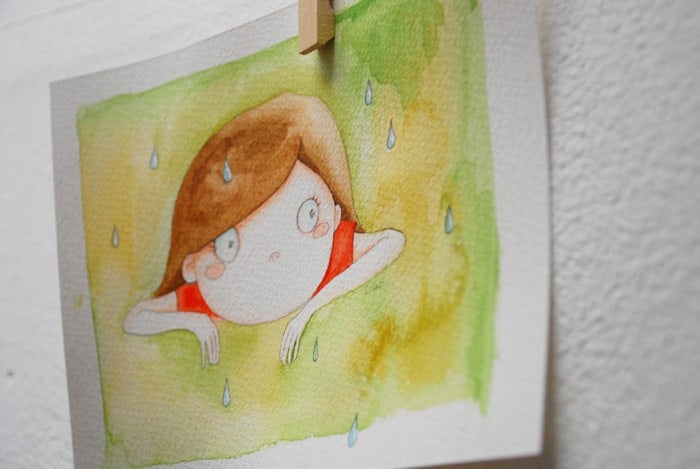My last day in Rio was a lonely one. My newfound friends had mostly left the city, moving on to new adventures or returning home to the same old thing but different – accomplished, enamored, inspired. I was exhausted. I had no energy to travel, see the sights, even walk around. It ached to leave the hostel, to see the city now so empty when mere hours before a flood of millions had filled the streets.
It wasn’t so much the crowd that I missed but particular faces in it – individual people I had exchanged a few thoughtful words with or an encouraging embrace, or even a momentary expression of confusion or fatigue. I missed the ones I had met in that sea of millions because there was something shared there. Bread was broken, prayers were whispered and deep desires were revealed. The simple questions asked of those on pilgrimage unveiled a depth of heart in people: Where do you come from? Why are you here? What are you looking for?
I was surprised to feel such disappointment at the end. Before the event I thought it would be something to survive, something to get through, something I’d be happy to have behind me. But in the midst of the experience – perhaps in the need to survive it – I found something precious and attached myself to it in a way that is yet hard to explain. I felt myself connected to something rushing past me and as it moved by, as it was torn from the grasp of my experience, I felt the pain of losing something I had come to love.
***
It doesn’t always move so fast, but this Jesuit life is a life of falling in love and it seems now that this is what happened in Brazil. I fell in love there as I’ve fallen in love in other places and, as we know, this falling in love is deeply rooted in the business of finding God. Ignatius tells us that love is active and mutual, never easy, always gift. At times I gave fatigue and received samba drum circles. At others it was an exchange of smiles, of food, or a listening ear and an open heart. I gave myself in some small way to this experience and in the act of self-gift lies the heart of love. And, to be sure, in love there is pain.
I’m now home again yet strangely lonely. My pilgrim friends are gone. Some I’ll see again. Others I threw my heart at I will not. This fact forces me to doubt the authenticity of these fast friendships and this doubt leads to a deep despair – All that noise for naught, it says.
The only antidote is gratitude, to trust that love was real, that the desire to love was well ordered, and that love was truly experienced – however painfully short lived.
***

Holding Heart by kurichan+ at Flickr
Back in Brazil, sitting on my bed in a pilgrim-bare room, I think: it’s in God – in the moment itself, in the experience of loving – that we believe that love is eternal. But in the end (and now it feels very much like an end) it is our temporality that pains us: the not-yet’s, the maybe-later’s, the might-have-been’s; the never-will-be’s. Here is suffering. Here is wanting to be somewhere other than where you are. Here is the longing to go home.
Leaving feels like sickness, like a pit in the stomach or an ache in the heart. Anxiety and restlessness rise in me. I feel the need to move, to be active, but I have nothing to do and nowhere to go. It’s sad. I feel left behind. And it’s not justified – my own departure only a few hours behind theirs – but the feeling is not unfamiliar. To be left behind when the ones you love move on… we’ve all felt it. To care for someone, even for a moment, and then to let them leave, to face the fact of their departure (a foreshadowing of death) is only tolerable in denial, never in truth. Even those who love in perfect freedom can’t escape the pain of its depths.
Sitting on my bed the last inaudible lines of Sofia Coppola’s film, Lost in Translation appear unbidden in my mind. Bill Murray has leaned into Scarlett Johansson’s hair; he whispers, “I have to be leaving, but I won’t let that come between us.”
You can’t actually hear it spoken. It was only seeing his lips move and wondering what he was saying that lead me to find it, an aching curiosity that found me turning the volume all the way up, and searching through the static to find it. I’m glad that I did. I love the line and think of it as another incarnation of Jesus’ romantic farewell to his friends: Remain in my love and my love will remain in you.
***
At home I sit alone in my room and type these words: When you’re feeling left behind, Brendan, or if you’re the one leaving, Brendan, it’s then that Jesus’ command to remain takes on even more weight. Remain in love. Stay in this moment. Live without leaving.
The complementarity of our temporal being and Love’s eternal becoming is our only hope. Stay in my love and my love will stay in you. Through death, diminishment, and departure: I love you. Remain in my love and love will remain in you; it will stay in you, make a dwelling place in you; love will be at home in you.
***
At one point in his Brazilian visit Pope Francis said that, “The most important person is the one in front of you.” In this observation lies the moral obligation that will liberate us all.
But we ought to add something about when they, or we, must leave: Miss them when they’re gone and grief will open up a place in you. The pummeling you feel in their absence will soften your heart – if you let it. In this softened place (which is a weakening to be sure, a real vulnerability) you will love with greater tenderness the next neighbor that you meet. You will know in your depths how precious they are and fleeting. You will breathe them into yourself with gratitude and accept them as they are, a gift, an uncontrollable other.
In this way every moment can be lived as a privileged moment, and every leaving as a new becoming. I read once in a synagogue prayer book that, “We hate leaving, but God loves becoming.” To live without leaving is simply to remain in love’s becoming. To remain in this place is to know that nothing can come between us, and that love alone will fill the space of our longing. So when our heart aches and our friends are gone we do the only thing we ever ought to do – we remain in love.
***
Cover image by nicole.pierce.photography at Flickr can be found here.



